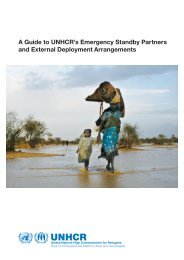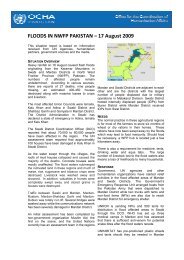Women, Girls, Boys and men - HumanitarianInfo.org
Women, Girls, Boys and men - HumanitarianInfo.org
Women, Girls, Boys and men - HumanitarianInfo.org
Create successful ePaper yourself
Turn your PDF publications into a flip-book with our unique Google optimized e-Paper software.
possIble protectIon ActIvItIes<br />
1. Responsive action<br />
I A s c g e n D e r h A n D b o o k<br />
• alleviate immediate suffering by means of appropriate material assistance to affected persons <strong>and</strong> their families; medical assistance<br />
to affected persons <strong>and</strong> their families; psycho-social care to affected persons <strong>and</strong> their families; support (technical help to<br />
local structures [public <strong>and</strong> private]).<br />
• provide direct services to persons exposed to abuse by means of their presence in the affected areas, idp/refugee camps, places of<br />
detention, etc.; transfers /evacuations (including relocation of refugees or idps farther from conflict zones or borders); registering<br />
persons; re-establishing/maintaining family links (tracing missing relatives, <strong>org</strong>anizing family visits, exchanging messages <strong>and</strong>/or<br />
letters); information <strong>and</strong> communication (e.g. about human rights conditions, conditions for return, information about the work of<br />
various <strong>org</strong>anizations, location of resources, etc.).<br />
• integrate human rights protection into humanitarian needs assess<strong>men</strong>t, programming, monitoring <strong>and</strong> evaluation.<br />
• monitor <strong>and</strong> report, including providing information to officials at un headquarters, inter-govern<strong>men</strong>tal human rights mechanisms<br />
<strong>and</strong> other such bodies.<br />
• pressure the authorities concerned, through public disclosure, into taking the required measures to stop <strong>and</strong> prevent the abuse.<br />
• Convince the authorities concerned, through dialogue, into taking the required measures to stop <strong>and</strong> prevent the abuse.<br />
• Contribute to obtaining respect for judicial rights of the individual by providing legal assistance/support to the persons subjected<br />
to a judicial process <strong>and</strong> their families; supporting <strong>and</strong> protecting institutions (govern<strong>men</strong>t, local nGos, etc.), working toward<br />
respect for rights as well as individuals working as human rights defenders.<br />
2. Remedial action<br />
• provide direct services to the persons affected by abuse by means of: their presence in affected areas, displaced/refugee<br />
camps, places of detention, etc.; help in voluntary repatriation/resettle<strong>men</strong>t/return/property, housing <strong>and</strong> l<strong>and</strong>; restitution/<br />
(re)integration/final arrange<strong>men</strong>ts; maintaining family links; contributing to the setting up of mechanisms to clarify the fate<br />
of missing persons; facilitating information <strong>and</strong> communication.<br />
• promote <strong>and</strong>/or support the due process of law <strong>and</strong> justice for both perpetrators <strong>and</strong> victims.<br />
• proceed with “lessons-learned” exercises aimed at feeding <strong>and</strong> reinforcing “environ<strong>men</strong>t building”-type activities.<br />
3. environ<strong>men</strong>t building<br />
• disseminate, promote <strong>and</strong> apply international human rights <strong>and</strong> humanitarian st<strong>and</strong>ards.<br />
• promote the drafting <strong>and</strong> adoption of treaties <strong>and</strong> the develop<strong>men</strong>t of customary law.<br />
• promote the administration of a fair system of justice providing for punish<strong>men</strong>t <strong>and</strong> reparation for violations of international human<br />
rights <strong>and</strong> humanitarian law.<br />
• Create a public culture consistent with human rights <strong>and</strong> humanitarian values.<br />
• promote knowledge of <strong>and</strong> adherence to human rights <strong>and</strong> humanitarian law instru<strong>men</strong>ts <strong>and</strong> principles among all groups<br />
concerned.<br />
• Contribute to the develop<strong>men</strong>t <strong>and</strong> establish<strong>men</strong>t of institutions, both govern<strong>men</strong>tal <strong>and</strong> non-govern<strong>men</strong>tal, at the national <strong>and</strong><br />
international levels which, by their role <strong>and</strong> function, can enhance respect for human rights <strong>and</strong> humanitarian law.<br />
• undertake advocacy — bring violations to the attention of human rights monitors <strong>and</strong> protection officers so that they may make<br />
representations to the relevant authorities.<br />
• Build local <strong>and</strong> national protection capacity — national human rights bodies, civil society, the judiciary, etc..<br />
• provide protection training for international staff, national authorities, non-state actors, civil society, the judiciary, the police,<br />
prison staff, etc.<br />
T H e I n T e R n AT I o n A l l e G A l F R A m e w o R k F o R P R o T e C T I o n<br />
LEGAL FRAMEWORK











